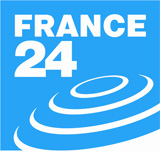The world through French eyes
By Umar Muhammad
Remember the wave of anti-French sentiment in the U.S. in 2003? Some American restaurants rewrote their menus to offer “freedom fries” instead of French fries, and national TV networks aired scenes of angry Americans dumping bottles of French wine to protest France’s resistance to U.S. talk of an invasion of Iraq.
Then-president Jacques Chirac of France couldn’t get a break on U.S. or British media. His explanations for why he wouldn’t join an invasion force were hard to find among all the denunciations of France.
The anti-France campaign was a painful reminder that Chirac’s country – once a powerful global empire and still one of the five permanent members of the United Nations Security Council – has steadily lost its global footing over the past several decades. To counteract that, French officials had long debated the creation of a global TV service – a la Britain’s BBC or America’s CNN – to put a French imprint on the news.
In 2006, with a budget of $110 million and a staff of 170 journalists, France 24 was born, an around-the-clock state-owned news channel that began broadcasting in English and French over a satellite signal. French newspapers quickly dubbed it “CNN a la francaise.”
The French government finances the network, and it shares some resources with state-funded France Television, which serves a domestic audience. But it also has a partnership with the private channel TF1, giving it additional equipment, technical staff and access to that channel’s reporting.
According to the government, France 24’s English service is distributed to 105 million homes around the world. The French language version is distributed to 96 million homes, and the Arabic service that began transmission in 2007 is available in 67 million homes. The total budget for the three channels in 2011 was set at $145 million, according to a finance bill introduced in the French Senate.
Although the availability numbers are impressive, actual viewership is considerably smaller, according to the finance report. Twenty million households watch the English broadcasts, for example, with the largest proportion of those viewers in Europe.
The channel’s French version may be a bigger challenger to BBC and CNN. It is popular in Francophone Africa (the number one global channel there, according to French government reports). In France’s former colonies in Northern Africa, Algeria, Morocco, and Tunisia – also referred to as the Maghreb –its viewership is second only to Al Jazeera, according to the government.
France 24 offers professional, objective reporting from a large staff of correspondents around the globe. While much of the world’s media largely ignored the political crisis in the Ivory Coast until its final violent stage this year, France 24 covered the story nonstop.
France 24 was also among the first broadcasters to bring viewers in-depth coverage out of Libya, at a time when other channels were still focusing mostly on the Egyptian crisis. The channel’s reputation and audience help it get some exclusives, including an early interview with Libyan dictator Muammar Gaddafi. CNN had to be satisfied with interviewing a France 24 journalist about the interview, and not Gaddafi himself.
France 24 reporters were the first ones to broadcast images from the frontlines during the battle for Brega, which was fought between Gaddafi forces and Libyan rebels.
Today, the network employs 260 full-time staff reporters and has access to more than 700 additional reporters through cooperation agreements with France Television, Societe Television Francaise, Radio France Internationale, and Government Radio Network.
While viewers in Africa and Middle Eastern countries clearly see France 24 as a welcome alternative to the often highly restricted media in their homelands, skeptics still question the service’s ability to take government money and remain independent.
“That [government funding] might make you raise your eyes,” acknowledged France 24 editorial director Jean Lesieur at a Columbia University forum on global media last November. But, “we are truly independent,” insisted Lesieur. “We don’t do propaganda for the French government.”
An example of France 24 being critical of the current president can be seen in this clip:
Though its reporting does seem largely free of government influence, the channel requires its journalists to sign a mission statement, stating that they will “cover international news with a French perspective… and carry the values of France throughout the world.”
“We think France 24 will bring a different point of view, a different opinion, one that recognizes the diversity of the world,” said France 24 CEO Alain de Pouzilhac in an interview with the BBC.
“It’s the opposite of what the U.S. does,” Pouzilhac said. “The vision from Washington tries to show that the world is unified, whereas we will try to demonstrate the opposite: that the world has a lot of diversity. Diversity of culture, diversity of religion, and diversity of opinion.”
Pauline Eiferman, Elettra Fiumi and Umar Muhammad reported on France 24.

